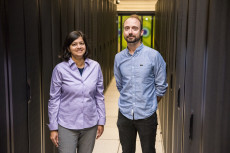Lavanya Ramakrishnan Presents at JSSPP and ESSA
July 8, 2022
By Carol Pott
The volume, veracity, and velocity of data generated by scientific tools have grown exponentially in the last decade. This boom has fundamentally changed the scientific workflow running on high performance computing (HPC) systems.
Lavanya Ramakrishnan, senior scientist and deputy director of the Scientific Data Division, thinks a lot about workflows and the data lifecycle challenges on HPC systems, including the effective use of storage hierarchy, managing complex scientific data processing, and enabling search on large-scale scientific data.
In a June 3 keynote at the 25th annual Workshop on Job Scheduling Strategies for Parallel Processing, Ramakrishnan explained that new workflow characteristics coming from data impacts the design of next generation infrastructure. Ramakrishnan also presented on data lifecycle challenges in HPC in an invited talk at ESSA 2022, the 3rd Workshop on Extreme-Scale Storage and Analysis on the same day.
About Berkeley Lab
Founded in 1931 on the belief that the biggest scientific challenges are best addressed by teams, Lawrence Berkeley National Laboratory and its scientists have been recognized with 16 Nobel Prizes. Today, Berkeley Lab researchers develop sustainable energy and environmental solutions, create useful new materials, advance the frontiers of computing, and probe the mysteries of life, matter, and the universe. Scientists from around the world rely on the Lab’s facilities for their own discovery science. Berkeley Lab is a multiprogram national laboratory, managed by the University of California for the U.S. Department of Energy’s Office of Science.
DOE’s Office of Science is the single largest supporter of basic research in the physical sciences in the United States, and is working to address some of the most pressing challenges of our time. For more information, please visit energy.gov/science.










